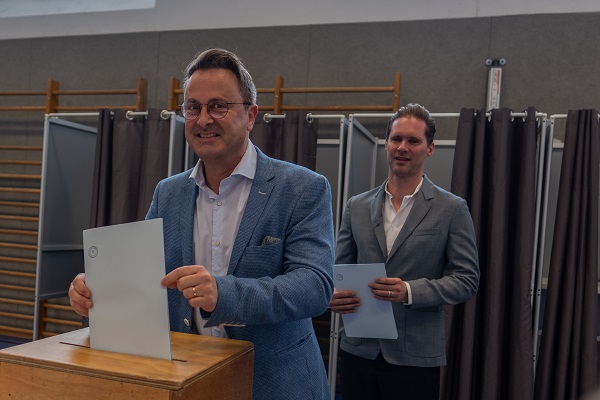 Incumbent Prime Minister Xavier Bettel (pictured with his husband) submits his ballot on election day, 8 October 2023;
Credit: Ali Sahib
Incumbent Prime Minister Xavier Bettel (pictured with his husband) submits his ballot on election day, 8 October 2023;
Credit: Ali Sahib
Luxembourgish voters went to the polls on Sunday 8 October 2023 to elect 60 deputies (MPs) to the Chamber of Deputies (parliament) for the next five years.
A total of 249,968 ballots (including 67,023 by post) were submitted, of which 231,344 were valid.
Voting took place in polling stations across the Grand Duchy between 08:00 and 14:00 on Sunday, with the first complete results known around 18:00. The full results were out shortly before 23:00.
Like in the 2018 legislative elections, the Christian Social People's Party (CSV) emerged as the largest party overall, achieving stable results across the four electoral districts (South, Centre, North, East) and retaining its 21 seats in parliament. The Greens (déi Gréng) - one of the current coalition parties - suffered heavy losses and saw their seats reduced from nine to just four - one short of the five needed for a parliamentary "fraction". This result differed greatly from the last elections when the Greens emerged as the biggest winners (having gained three seats compared to the 2013 elections).
The Democratic Party (DP) gained two seats (from twelve in 2018 to fourteen in 2023), whilst the Luxembourg Socialist Workers' Party (LSAP) secured one additional seat (from ten to eleven).
Despite the gains made by the DP and the LSAP, the poor performance of the Greens means the current triple coalition government has lost its majority (31 out of 60 seats). A new coalition is expected to bring the CSV back to power after ten years in the opposition. The most probable possibilities are a CSV-DP coalition (35-seat majority) or a CSV-LSAP coalition (32-seat majority). As the lead candidate of the largest party, Luc Frieden (CSV) could become the next Prime Minister of Luxembourg, although as an individual candidate he secured fewer votes (30,999) than incumbent DP Prime Minister Xavier Bettel (34,018) - both were running in the Centre district.
There were mixed results for the smaller parties, with the Left (déi Lénk) just managing to hold on to its second seat in parliament and the Pirates (Piraten) securing a third seat. The Alternative Democratic Reform Party (ADR) also obtained an additional seat, bringing its total to five - enough to form a "fraction". The ADR is now the country's fourth largest party.
Fokus, Volt, the Communist Party (KPL), Liberté-Fräiheet and the Conservatives (déi Konservativ) failed to secure any seats.
Looking closer at the four districts, the South (23 seats in total) saw seven seats for the CSV (including one for Esch-sur-Alzette Mayor Georges Mischo), six for the LSAP (including seats for current government ministers Jean Asselborn and Taina Bofferding), four for the DP (including one for Family Affairs Minister Max Hahn) and two for the Greens (including one for Environment Minister Joëlle Welfring). The ADR also secured two seats, whilst the Pirates and the Left won one each.
In the Centre (21 seats), the CSV won seven seats (including lead candidate Luc Frieden), the DP won six (including lead candidate Xavier Bettel and Finance Minister Yuriko Backes), the LSAP won three (including Economy Minister Franz Fayot) and the Greens won two (including lead candidate Sam Tanson). The ADR, the Pirates and the Left each obtained one seat.
In the North (nine seats), the CSV won four seats (including MEP Christophe Hansen), the DP won two (including Chamber of Deputies President Fernand Etgen) and the LSAP won one seat (Agriculture Minister Claude Haagen). The ADR and the Pirates each obtained one seat.
In the East (seven seats), the CSV secured three seats (including Grevenmacher Mayor Léon Gloden), the DP obtained two (including Tourism Minister Lex Delles) and the LSAP got one seat (lead candidate and current Health Minister Paulette Lenert). The ADR won back its East seat from the Greens.
On Monday 9 October 2023, the Grand Duke of Luxembourg will meet successively with current Prime Minister Xavier Bettel, Chamber of Deputies President Fernand Etgen and the President of the Council of State, Christophe Schiltz. He will then meet with representatives of the elected parties. Grand Duke Henri will ultimately appoint a "formateur" (traditionally the next Prime Minister) tasked with forming a new government.








